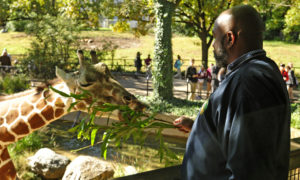 (Philadelphia, PA) – The Freeholder Board’s Office of Sustainability, which runs the community garden at the Camden County Environmental Campus at Lakeland, has partnered with Philadelphia Zoo to supplement its animal nutrition program which aims to source food locally as part of its sustainability efforts.
(Philadelphia, PA) – The Freeholder Board’s Office of Sustainability, which runs the community garden at the Camden County Environmental Campus at Lakeland, has partnered with Philadelphia Zoo to supplement its animal nutrition program which aims to source food locally as part of its sustainability efforts.
“We are proud to partner with Philadelphia Zoo and assist in providing healthy locally-sourced greens for their herbivorous reptiles, birds, apes and monkeys,” said Freeholder Jonathan Young, liaison to the Office of Sustainability. “We provide the Zoo with a variety of green leafy vegetables. Fresh produce is a main component of the diets of many zoo animals.”
The Office of Sustainability, with support from the Rutgers-Camden Master Gardeners program and community volunteers, has developed a hydroponic greenhouse as a component of their community garden. At the location, they grow a variety of vegetables, herbs and over 20 varieties of lettuces in five different types of hydroponic systems.
“The greenhouse is not only being used to grow healthy food year-round, it also serves as a demonstration site for others to learn how to effectively grow produce hydroponically,” Young said. “The revenue we generate from our partnership with Philadelphia Zoo goes to offset the costs of growing, creating a cost-neutral program for the county with many numerous benefits.”
The nutrition program at Philadelphia Zoo uses an evidence based approach to diet formulation. Diet development is based on digestive morphology, natural history and historical success within the zoological community. Great care is taken to ensure animals receive wholesome foods that are sustainably and humanely sourced.
“We are happy to partner with The Freeholder Board’s Office of Sustainability and the community garden at the Camden County Environmental Campus to supplement our nutrition program at the Philadelphia Zoo,” says Barbara Toddes, the Zoo’s Nutrition Program Director. “This partnership enables the Zoo to purchase fresh, local greens for our animals.”
Since the greenhouse’s first season in the winter of 2017, the team of staff and volunteers has installed five types of hydroponic systems including ebb and flow, NFT (nutrient film technique), Dutch bucket (vertical), floating systems and an aeroponics system.
Hydroponics is a soil-less approach to gardening that has been utilized for thousands of years. Hydroponic gardening tends to produce larger plants and higher yields due to the nutrient rich solution delivered directly to the plant root system. This makes for easier access to nutrients compared to traditional soil gardening in which the plants need to search for nutrients. Furthermore, the reuse of the nutrient solution utilizes less water than conventional gardening.
“What’s unique about our program is that when it’s cold and no one is growing outside, our production is at its peak inside our temperature-controlled greenhouse,” Freeholder Young explained. “At any given time, we are growing up to 800 heads of lettuce, as well as beans, tomatoes, cucumbers and more. We are also a resource for schools, businesses, non-profits, and County residents looking to learn more about these techniques.”
The agreement allows the Zoo to purchase lettuce at about 50 cents a head to cover some of the operating costs of the greenhouse and make it possible for the community garden to donate food to community organizations.
The Zoo is just one of the local partners participating in the program. Camden County Senior Services, Cathedral Kitchen and the Neighborhood Center in Camden, all of which serve at-risk populations, benefit from the greenhouse.
Ultimately, the project’s mission is to create a place to produce locally-grown vegetables in an environment where food safety, nutrition and water conservation are key principles to combating food deserts in low-income urban areas.
Camden County has received a grant from Rutgers University to help feed those in need of fresh produce. In 2018, over 500 pounds of produce were donated to partner organizations.
The Camden County hydroponic greenhouse is located at 508 Lakeland Road in Gloucester Township. The Camden County Environmental Campus is the newest addition to the Camden County Park System has transformed an eight-acre site at the Lakeland Complex in the Blackwood neighborhood into a hub for community gardening and environmental education.
ABOUT PHILADELPHIA ZOO:
Animals are on the move like never before at Philadelphia Zoo with Zoo360, a first-in-the-world system of see-through trails passing through treetops, crossing over pathways and connecting habitats, giving animals like amazing big cats, majestic primates and marvelous meerkats the opportunities to travel and explore. Visit our new baby western lowland gorillas, giraffes, hippos, white rhino, zebras, red pandas, Amur tigers and more at America’s first Zoo. Explore our 42 acre Victorian garden and enjoy award-winning exhibits like KeyBank Big Cat Falls, PECO Primate Reserve, McNeil Avian Center and KidZooU, a wildlife academy that offers dynamic displays, rare breeds and hands-on experiences. Philadelphia Zoo is the second highest ticketed attraction in Philadelphia, one of the region’s foremost conservation organizations and home to nearly 1,300 animals, many rare and endangered. By connecting people with wildlife, Philadelphia Zoo creates joyful discovery and inspires action for animals and habitats. The Zoo welcomed more than 1.25 million visitors last year. Philadelphia Zoo is accredited by the Association of Zoos and Aquariums. Philadelphia Zoo is a non-smoking facility.
For more information on, as or to purchase and print tickets online, visit us at www.PhiladelphiaZoo.org. Facebook: PhiladelphiaZoo; Instagram: @philadelphiazoo; Twitter: @phillyzoo.
